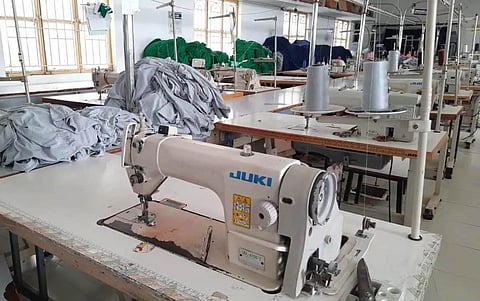

TIRUPPUR: As a textile city, Tiruppur faces the risk of a self-imposed lockdown due to fluctuating yarn prices that have forced most garment export units to cut down on procurement and stop accepting fresh orders, migrant workers are feeling the pinch.
Though the city is teeming with workers from other states, effort by Tamil Nadu authorities and NGOs to reach out to them is facing trouble as there is no ‘official’ data on their exact number.
According to the Tamil Nadu revenue department, there are more than 1.3 lakh migrants workers in the city. The data available with the industry safety and health department (Tiruppur) pegs the number at 64,300.
Explaining the difference, a revenue official told TNIE that their number is based on data collected by revenue officers during the Covid-19 aid distribution in 2020 when migrants who lost jobs were unable to travel back to their native villages. “A large number of migrants moved out through special trains operated between May and September in 2020. We received information from social activists and volunteers that many of them did not return to Tiruppur. Also, many workers might have shifted to other sectors as the garment industry is no longer lucrative,” the officer said.
According to N Ramasamy, coordinator of Odisha Migration Support Centre, there are 12,000 workers from Odisha in Tiruppur district. “They have all registered with us and employed in large companies that have turnover of hundreds of crores under Deendayal Upadhyaya Grameen Kaushalya Yojana (DDUGKY) scheme,” Ramasamy said.
‘Difficult to track unregistered workers ’
“But it would be difficult to count and track unregistered workers from Odisha and other states. They arrive through manpower agencies and references from existing workers, and are employed in SMEs. Over the last six months, I noticed large-scale movement of unregistered Odisha workers away from Tiruppur district,” Ramasamy said.
An officer in the district social welfare department said it is very difficult to track migrant workers as they are scattered across the district. “We had a plan to get migrant workers registered when they arrive at Tiruppur railway station. We had sent the proposal to railways, but it is yet to be approved.” Tiruppur Exporters Association (TEA) president KM Subramanian said the sector is going through a fresh crisis.
“After a steep rise between December 2021 and May 2022, the price of yarn across all categories has fallen below `350 per kg. But the hike was unnatural as a result of which small and medium sized exporters could not negotiate orders. Not wanting to hold inventory, they reduced procurement of yarn substantial. Yarn price could fall further,” Subramanian said.
Small and medium garment units survive on low margins, and the unstable yarn price has been a permanent worry for them. Also, since SMEs do not have dyeing, knitting, compacting, stitching and garment printing units under a single roof, they go for outsourcing. According to official data, there are over 6,200 units across these sectors.
A majority of these units employ migrant workers in large numbers. With garment units reducing procurement to protect their finances, the process industries bear the brunt, and the axe has fallen on migrant workers. Asked what will happen to workers in such a tough situation, the social welfare department officer said,
“We already have the E-shram scheme, which offers accident insurance cover of `2 lakh under PMSBY. Since the scheme offers social security, we are planning to register migrants with the help of NGNGOs.” Vizhuthugal Trust coordinator V Govindarajan said, “Workers who are members of EPFO/ESICIC or NPS are eligible for E-shram. But most workers from north and northeastern states are not aware of the E-shram portal and card.
We need a large-scale campaign to educate them.” Lack of credible data on migrant population poses a challenge to law enforcement officials too. Tiruppur police commissioner C Prabhakaran said it is very difficult to keep a count on migrant workers as a majority of them are unskilled and hop jobs wherever the pay is good. “We will sensitise garment unit owners, HR personnel, and manpower agents to maintain a record of workers they employ, including Aadhaar, voter ID, and ration card (if possible). I believe such a database can help trace not just unscrupulous elements, but help migrants during an emergency.”